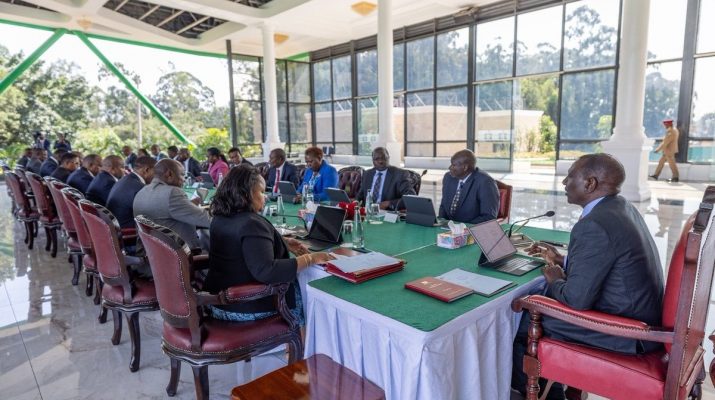By Diana Wenwa
President William Ruto chaired a crucial Cabinet meeting at State House Nairobi, resulting in several significant decisions and approvals aimed at various sectors of the economy.
During the meeting, the Cabinet sanctioned a comprehensive debt waiver for coffee farmers and endorsed other reforms within the coffee sector.
This initiative includes the write-off of historical debts totaling KSh6.8 billion owed by coffee farmers across the nation.
To facilitate this, coffee cooperatives, SACCOs, and other creditors must submit lists of indebted farmers, along with supporting documentation, to the Ministry for Cooperatives within seven days for verification and payment processing.
The Cabinet warned that any fraudulent claims would be prosecuted according to the law.
In a related move, the Cabinet urged Parliament to expedite the enactment of governance reforms for cooperatives.
These reforms aim to establish institutional safeguards, including mandating that borrowing by cooperatives must be authorized by farmers during annual general meetings.
Further efforts to enhance the coffee production value chain include modernizing the New Kenya Planters Cooperative Union (KPCU) to align with international best practices.
To improve coffee parchment quality, modern eco-pulpers will be established in emerging coffee-growing areas.
Additionally, enhanced coffee seedling propagation under the Coffee Research Institute (CRI) aims to boost production to a target of 200,000 metric tonnes by 2027. These interventions are designed to reposition Kenya’s coffee as a leading global export.
The Cabinet also approved the framework for transitioning from the National Health Insurance Fund (NHIF) to the Social Health Authority (SHA), starting July 1, 2024. The Ministry of Health will lead a mass registration exercise beginning June 21, 2024, across all 47 counties.
Kenyans can register via phone, at public hospitals, or through 100,000 Community Health Promoters nationwide.
Additionally, the Cabinet approved the divestiture of the state’s shareholding in six listed companies, optimizing these investments to support national development goals.
The companies include East African Portland Cement Limited, Nairobi Securities Exchange (NSE), Housing Finance Company of Kenya Limited, Stanbic Holdings, Liberty Kenya Holdings, and Eveready East Africa PLC.
To further strengthen the tourism and aviation sectors, the Cabinet approved the National Aviation Policy, aimed at enhancing connectivity and expanding the capacity of international airports to meet future demand, projected to reach 42.1 million passengers annually by 2050. The JKIA Medium Term Investment Plan was also approved, which includes upgrading various airport facilities.
Kenya’s commitment to international cooperation and hosting major conferences continues with Cabinet approval for the Blue invest Africa Forum in July 2024 and the World Congress of the International Union of Forest Research Organization (IUFRO) in August 2024.
These events align with Kenya’s foreign policy objectives focused on climate change adaptation and the blue economy.
In celebration of cultural heritage, Kenya will host East African Community (EAC) member states for World Kiswahili Day from July 5-7, 2024.
The Cabinet will reconvene on Thursday, June 13, 2024, to consider the highlights of the Financial Year 2024/25 Budget Policy Statement before its presentation to the National Assembly.

